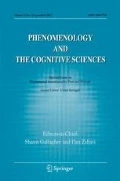Abstract
“Ontological emergence” of inherent high-level properties with causal powers is witnessed nowhere. A non-substantialist conception of emergence works much better. It allows downward causation, provided our concept of causality is transformed accordingly.
Similar content being viewed by others
Notes
This problem of “radical situatedness” is discussed and developed in a recent paper of mine. Bitbol (2002)
In these matters, it is crucial “(...) to be clear about whether we are investigating a limitation of scientific description or something about actual physical processes in the world” (Deacon, 2003).
Of course, this strategy of interpretation hides a crucial dialectic between third-person and first-person accounts: from behavior to intention, and then back again (by means of the usual strategy of projection) to intentional behavior. This issue of first-person standpoint will be briefly evoked in the conclusion.
I thank David Rudrauf (LENA, Hôpital de la Salpêtrière, Paris) for formulating this sound reductionist objection.
References
Bickhard, M., & Campbell, D. T. (2000). Emergence. In P. B. Andersen, C. Emmerche, N. O. Finnemann, & P. V. Christiansen (Eds.) Downward causation. Denmark: Aarhus University Press.
Bitbol, M. (1996). Schrödinger’s Philosophy of Quantum Mechanics. Dordrecht: Kluwer.
Bitbol, M. (2002). Science as if situation mattered. Phenomenology and the Cognitive Science, 1, 181–224.
Cao, T. Y., & Schweber, S. S. (1993). The conceptual foundations and the philosophical aspects of renormalization theory. Synthese, 97, 33–108.
Castellani, E. (2002). Reductionism, emergence, and effective field theories. Studies in History and Philosophy of Modern Physics, 33, 251–267.
Deacon, T. W. (2003). The hierarchic logic of emergence: untangling the interdependence of evolution and self-organization. In B. Weber, & D. Depew (Eds.) Evolution and learning: The Baldwin effect reconsidered. Cambridge, MA: MIT.
Flanagan, O. (1998). Conscious inessentialism and the epiphenomenalist suspicion. In N. Block, O. Flanagan, & G. Guzeldere (Eds.) The nature of consciousness. Cambridge, MA: MIT.
Freeman, A. (Ed.) (2001). The emergence of consciousness. Exeter: Imprint Academic.
Garfield, J. (1995). The fundamental wisdom of the middle way (Nagarjuna’s Mulamadhyamakakarika). New York: Oxford University Press.
Humphreys, P. (1997). How properties emerge. Philosophy of Science, 64, 1–17.
Kronz, F. M., & Tiehen, J. T. (2002). Emergence and quantum mechanics. Philosophy of Science, 69, 324–347.
Minkel, J. R. (2002). The top-down universe. New Scientist, 175, 28.
Morgan, C.L. (1923). Emergent evolution. London: Williams and Norgate, IV, §20.
Nietzsche, F. (1956). Wille zur Macht. Kröners Taschenausgabe, Alfred Kröner, XVI §483.
Omnès, R. (1999). Understanding quantum mechanics. Princeton, NJ: Princeton University Press.
Schrödinger, E. (1935). The present situation of quantum mechanics. In J. A. Wheeler, & W. H. Zurek (Eds.) English translation in section I.11 of quantum theory and measurement. Princeton, NJ: Princeton University Press, 1983.
Silberstein, M., & McGeever, J. (1999). The search for ontological emergence. The philosophical Quarterly, 49, 182–200.
Teller, P. (1995). An interpretive introduction to quantum field theory. Princeton, NJ: Princeton University Press.
Wittgenstein, L. (1974). On certainty 248. Oxford: Basil Blackwell.
Author information
Authors and Affiliations
Corresponding author
Additional information
A former version of this paper was intended as part of my contribution to the Mind & Life meeting in Dharamsala (India) in October 2002 (in fact, only a small fraction of it was presented there). I thank all the participants, especially U. Goodenough, S. Chu, and P.L. Luisi for their cogent discussion. Very special thanks are due to His Holiness the Dalai-Lama, who provided both his intellectual insight and a quality which is seldom met in other conferences: a sense of unity of purpose and “embodiment” of knowledge, beyond the differences in standpoint.
Rights and permissions
About this article
Cite this article
Bitbol, M. Ontology, matter and emergence. Phenom Cogn Sci 6, 293–307 (2007). https://doi.org/10.1007/s11097-006-9041-z
Published:
Issue Date:
DOI: https://doi.org/10.1007/s11097-006-9041-z




